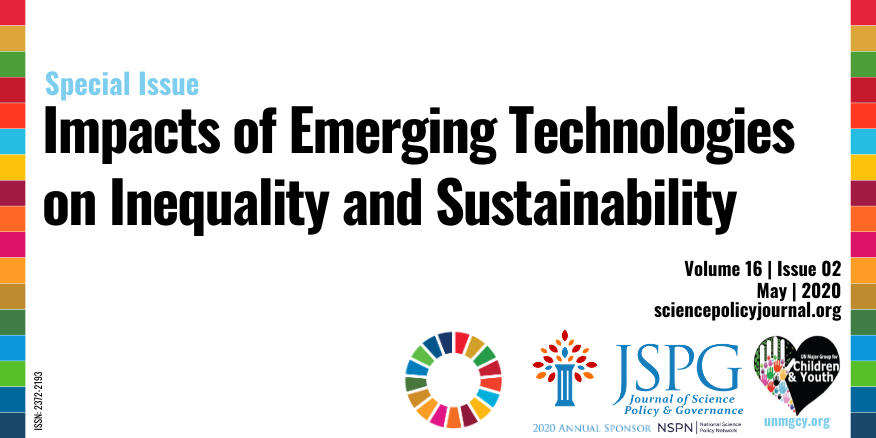|
Washington, DC – The Journal of Science Policy & Governance (JSPG), is proud to announce the release of its Special Issue on the Impacts of Emerging Technologies on Inequality and Sustainability. This issue was produced in collaboration with the United Nations Major Group for Children and Youth (UN MGCY), the formal mechanism for children and youth to engage in the United Nations, including the implementation, follow-up, and review of the Sustainable Development Goals (SDGs).
Sustainable Development Goals are 17 interconnected goals for countries to achieve by 2030, aiming to address the issues of poverty, inequality, climate change, environmental degradation, peace, and justice to "achieve a better and more sustainable future for all." In the fall of 2019, the JSPG and the UN MGCY teamed up to launch a joint call for submissions for a special topics issue around the "implications of emerging technologies on inequalities and sustainable development." As a result, the new issue "spans a variety of topics and styles, touching on critical issues of technology access and implementation, looking at assistive technologies and sanitary technologies, to UN policies, such as coordination of international aid, to tackling new areas where policy is necessary, such as the need for stronger planetary protection policy," said JSPG Assistant Editor-in-Chief for Special Issues, Madeleine Jennewein. "The six articles with authors from five nations, represent a broad work of scholarship on diverse areas that are critical to tackling the UN's development goals." In a statement for the issue, the Director of Division on Technology and Logistics for the United Nations Conference on Trade and Development, Shamika N. Sirimanne said, "Rapid technological change could be transformative in implementing the 2030 Agenda for Sustainable Development, and several frontier technologies have shown great potential to help to achieve the SDGs. At the same time, frontier technologies could also have unintended consequences, potentially widening inequalities or creating new ones. In this regard, I welcome this initiative by JSPG and UNMGCY to engage young researchers to improve our understanding of multidimensional implications of emerging technologies." Submissions to this special issue aim to inform discussions at the 2020 Commission on Science & Technology for Development, including the deliberations around the 2020 Technology and Innovation Report as well as the Multi-Stakeholder Forum on Science, Technology & Innovation on SDGs.
###
ABOUT JSPG
The Journal of Science Policy & Governance (JSPG) is a nonprofit organization and open-access, peer-reviewed publication managed by and for students, policy fellows, and scholars in science, technology, and innovation policy. Since 2011, JSPG has provided students and early career researchers a vehicle to bolster their research and writing credentials in science policy. Visit sciencepolicyjournal.org and follow @SciPolJournal on Twitter to learn more.
ABOUT UN MGCY
The UN Major Group for Children and Youth (MGCY) is the General Assembly-mandated official, formal, and self-organised space for children and youth to contribute to and engage in certain intergovernmental and allied policy processes at the UN since 1992. Our mission is to bridge children and youth and the UN system in order to ensure that their right to meaningful participation is realised. The UN MGCY, through its Youth Science-Policy Interface Platform, provides an open platform to engage young people from across the globe on topics related to science, technology, and innovation policy. Visit unmgcy.org and follow @UNMGCY on Twitter to learn more. Comments are closed.
|
JSPG NewsAll the latest news from the Journal of Science Policy & Governance. Archives
April 2024
Categories
All
|
- Home
- About
-
Volumes
- Volume 24 Issue 01
- Sigma Xi and Rita Allen Foundation - Civic Science for Transformative Policy Solutions to Societal Challenges
- Volume 23 Issue 01
- APS Policy and Governance on Science, Technology and Global Security
- IAI Development Policy and Global Change Science to Achieve the Vision of Sustainable Americas
- Volume 22 Issue 01
- GHFUTURES2030 Strengthening Youth-centered Policy and Governance of Digital Transformations in Health.
- UNESCO AND MGCY OPEN SCIENCE POLICIES AS AN ACCELERATOR FOR ACHIEVING THE SUSTAINABLE DEVELOPMENT GOALS
- Volume 21 Issue 01 >
- JSPG and UCL STEAPP Special Topics: Innovations in Science Diplomacy >
- Sigma XI-JSPG Special Issue: Re-envisioning STEM Education and Workforce Development for the 21st Century
- Volume 20 Issue 01
- JSPG Volume 19 Issue 01 (10 Years of Publishing)
- Special Issue: 2021 NSPN-JSPG Policy Memo Competition
- Special Issue: Shaping the Future of Science Policy
- JSPG-UK SIN Special Issue: Climate Change Solutions
- Volume 18 Issue 01
- Special Issue: 2020 NSPN-JSPG Policy Memo Competition
- Volume 17 Issue 01 (Supported by AAAS STPF)
- JSPG-UN MGCY Special Issue: Impacts of Emerging Technologies
- Volume 16 Issue 01
- Volume 15 (Supported by CSPC)
- Special Issue: 2019 NSPN-JSPG Policy Memo Competition
- Volume 14
- Volume 13
- Volume 12
- Volume 11
- Volume 10
- Volume 9
- Volume 8
- Volume 7
- Volume 6
- JSPG-UCS Special Issue: Healthy Food Policy
- Volume 5
- Volume 4
- Special Issue: Hot Topics 2013
- Volume 3
- Volume 2
- Volume 1
- Submit to JSPG
- Announcements
- Events
- Training
- Media Mentions
- Policy in action
- Podcast


 RSS Feed
RSS Feed
